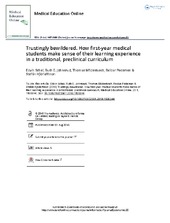Trustingly bewildered. How first-year medical students make sense of their learning experience in a traditional, preclinical curriculum
Peer reviewed, Journal article
Published version

Åpne
Permanent lenke
https://hdl.handle.net/1956/19813Utgivelsesdato
2018Metadata
Vis full innførselSamlinger
Originalversjon
https://doi.org/10.1080/10872981.2018.1500344Sammendrag
Background: Traditional preclinical curricula based on memorization of scientific facts constitute learning environments which may negatively influence both factual understanding and professional identity development in medical students. Little is known of how students themselves experience and interpret such educational milieus. Objective: To investigate first-year medical students’ view of the physician role, and their perception of the relevance and quality of teaching in a science-based preclinical curriculum. Design: Focus group interviews with thematic text analysis. Results: Students portrayed the good physician as communicative, humble, and open, combining biomedical knowledge and moral strength. When asked how medical school supported the development of such characteristics, two partly contradictory discourses emerged. The critical discourse identified decontextualized knowledge, poor pedagogy, lack of critical thinking, and contact with faculty. Students who voiced critical comments also articulated trust that the system would provide the competence they needed, that basic biological knowledge is needed before clinical practice, and that being on your own conveys freedom and responsibility, and helps you grow up. Conclusion: Trust in the educational system, within a substandard learning environment, created cognitive dissonance that students resolved through rationalization, whereby they negated that factual overload and lack of relevance, reflection, and personal feedback was problematic. The cost of this mechanism is possibly that inferior teaching is perceived as normal, necessary, and good enough. If so, these future physicians’ ability to critically evaluate and create quality in medical education and practice, may be weakened.
